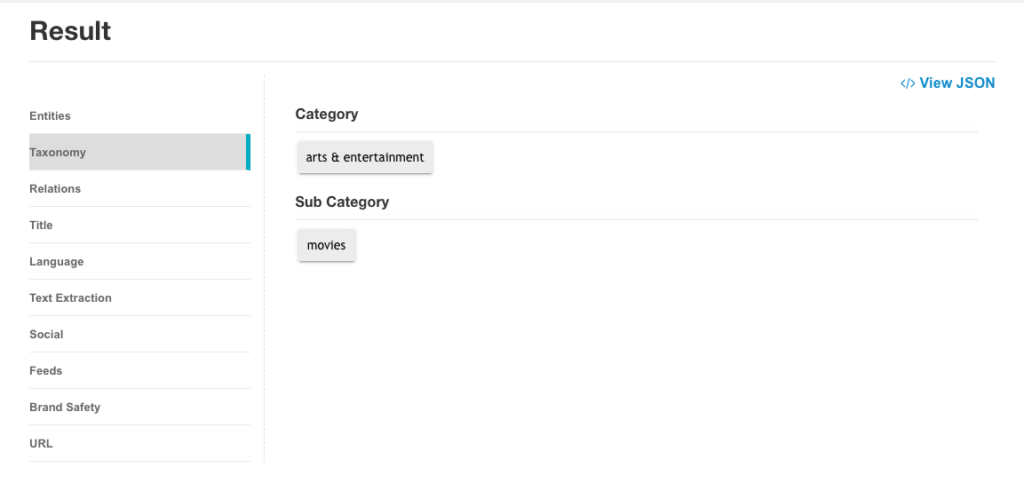Taxonomy
Overview
Automatic taxonomy construction (ATC) is the use of autonomous or semi-autonomous software programs to create hierarchical outlines or taxonomical classifications from a body of texts (corpus).
Taxonomy Using Catalyst UI
- Goto AmplifyReach Dashboard -> Bot Studio -> Left Navigation Sidebar
- Select Core Services > Text Analysis.
- Select URL or Text tab to enter the link or text for Text Analysis.

- Press Analyze button.
- Text Analysis Results will be shown.
- For Developers, you can view JSON by clicking </> View JSON on right corner.

Taxonomy Using AmplifyReach Catalyst API
Tip: Register your account on AmplifyReach and contact us at kick-start@amplifyreach.com to get Developer ID and Access Token.
URL & Objects
The following URLs are available.
| URL | Description |
|---|---|
PUT /textanalysis/v1/taxonomy | Put URL, Articles or Text for taxonomy analysis. |
GET /textanalysis/v1/taxonomy/{UID} | Get taxonomy of URL, Articles or Text using UID. |
PUT /textanalysis/v1/taxonomy
PUT https://launch.amplifyreach.com/textanalysis/v1/taxonomy
Headers:
| Name | Description |
|---|---|
| Content-Type | application/json |
| authToken | YOUR_DEVELOPER_ACCESS_TOKEN |
| cid | YOUR_DEVELOPER_ID |
PUT body
{ | OR | { |
cURL-PUT Request for URL Request
curl \
-H "Content-Type: application/json" \
-H "cid:<YOUR_DEVELOPER_ID>" \
-H "authtoken:<YOUR_DEVELOPER_ACCESS_TOKEN>" \
-X PUT \
-d '{"url":"<SAMPLE_URL_FOR_ANALYSIS>"}'\
https://launch.amplifyreach.com/textanalysis/v1/taxonomycURL-PUT Request for Text Request
curl \
-H "Content-Type: application/json" \
-H "cid:<YOUR_DEVELOPER_ID>" \
-H "authtoken:<YOUR_DEVELOPER_ACCESS_TOKEN>" \
-X PUT \
-d '{"text":"<SAMPLE_TEXT_FOR_ANALYSIS>"}'\
https://launch.amplifyreach.com/textanalysis/v1/taxonomyPut Response
The taxonomy put API response JSON structure.
| Name | Type | Description |
|---|---|---|
| status | String | Request Status (Reference: Status and Error Codes). |
| uid | String | UID is unique request identifier ID which to get result in Get API. |
Example: PUT Response
{
"status":"success",
"uid":"4f057e01d88ff7aa82a8610dc651e8fe",
"license":"By accessing AmplifyReach or using information generated by AmplifyReachAPI, you are agreeing
to be bound by the AmplifyReach Terms of Use."
}GET /textanalysis/v1/taxonomy/{UID}
Response Time:
Free Trial Account
– For URL as a payload, you can retrieve response after 10 seconds
– For Text as a payload, you can retrieve response after 1 seconds
Paid account:
– Higher QPS as per applicable plan
GET https://launch.amplifyreach.com/textanalysis/v1/taxonomy/{UID}
Headers:
| Name | Description |
|---|---|
| Content-Type | application/json |
| authToken | YOUR_DEVELOPER_ACCESS_TOKEN |
| cid | YOUR_DEVELOPER_ID |
cURL-GET Request
curl \
-H "Content-Type: application/json" \
-H "cid:<YOUR_DEVELOPER_ID>" \
-H "authtoken:<YOUR_DEVELOPER_ACCESS_TOKEN>" \
-X GET \
https://launch.amplifyreach.com/textanalysis/v1/taxonomy/{UID}Response Object
The taxonomy GET response has following JSON structure.
| Name | Type | Description |
|---|---|---|
| status | String | Request Status (Reference: Status & Error Codes). |
| category | JSONArray String | List of category (Reference: IAB Categories). One article can be occurs in multiple categories. As per priority. |
| subCategory | JSONArray String | List of sub category (Reference: IAB Categories). One article can be occurs in multiple categories. As per priority. |
Example: GET Response
{
"status":"success",
"category":[
"Arts & Entertainment"
],
"subCategory":[
"Movies"
]
}